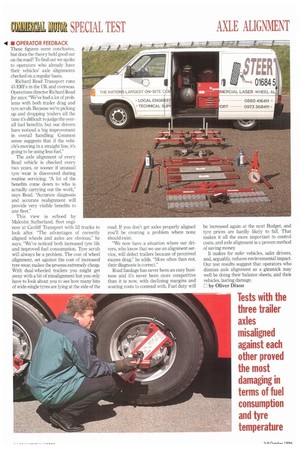IN OPERATOR FEEDBACK These figures seem conclusive, but does the
Page 30

If you've noticed an error in this article please click here to report it so we can fix it.
theory hold good out on the road? To find out we spoke to operators who already have their vehicles' axle alignments checked on a regular basis.
Richard Read Transport runs 45 ERFs in the UK and overseas. Operations director Richard Read Jnr says: "We've had a lot of problems with both trailer drag and tyre scrub. Because we're picking up and dropping trailers all the time it's difficult to judge the overall fuel benefits, but our drivers have noticed a big improvement in overall handling. Common sense suggests that if the vehicle's moving in a straight line, it going to be using less fuel."
The axle alignment of every Read vehicle is checked every two years, or sooner if unusual tyre wear is discovered during routine servicing. "A lot of the benefits come down to who is actually carrying out the work," says Read. "Accurate diagnosis and accurate realignment will provide very visible benefits to any fleet."
This view is echoed by Malcolm Sutherland, fleet engi neer at Cardiff Transport with 52 trucks to look after. "The advantages of correctly aligned wheels and axles are obvious," he says. "We've noticed both increased tyre life and improved fuel consumption. Tyre scrub will always be a problem. The cost of wheel alignment, set against the cost of increased tyre wear, makes the process extremely cheap. With dual-wheeled trailers you might get away with a bit of misalignment but you only have to look about you to see how many bits of wide-single tyres are lying at the side of the road. If you don't get axles properly aligned you'll be creating a problem where none should exist.
"We now have a situation where our drivers, who know that we use an alignment service, will defect trailers because of perceived excess drag," he adds. "More often than not, their diagnosis is correct."
Road haulage has never been an easy business and it never been more competitive than it is now, with declining margins and soaring costs to contend with. Fuel duty will be increased again at the next Budget, and tyre prices are hardly likely to fall. That makes it all the more important to control costs, and axle alignment is a proven method of saving money.
It makes for safer vehicles, safer drivers, and, arguably, reduces environmental impact. Our test results suggest that operators who dismiss axle alignment as a gimmick may well be doing their balance sheets, and their vehicles, lasting damage.
E by Oliver Dixon








































































































